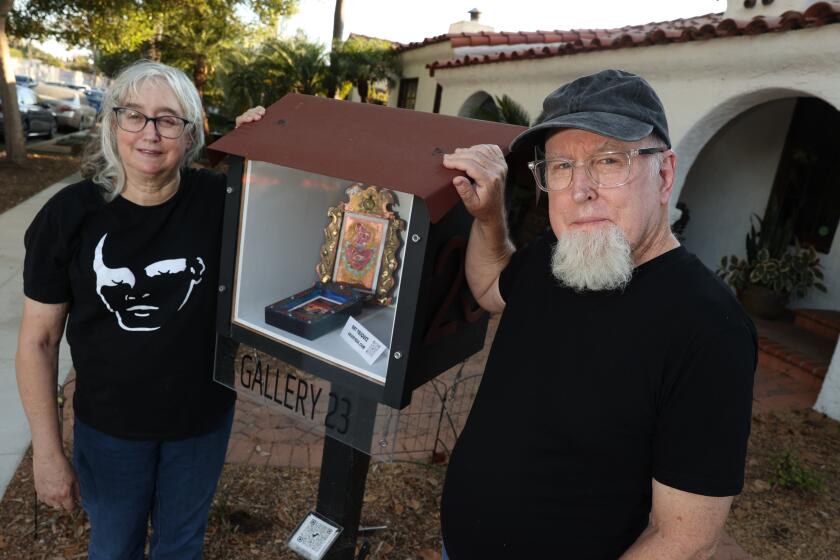Playwright Campbell Jumps From ‘Jump Street’ to ‘Figure’
Not long ago, playwright Clifton Campbell went back to Chicago to see one of his plays staged. “All of my theater buddies were there,” recalled the playwright, 30, “and they kind of joked about my selling out (he has recently turned to writing for a television series)--and some of them took it a lot harder than they had a right to. But not one of them neglected, at some point, to pull me aside and say, ‘So, do you think you could get me a job in television?’ ”
Campbell laughed out loud. As a staff writer for the Stephen Cannell television series, “21 Jump Street” (Sunday nights on Channel 11), the Florida native has a burgeoning career in a TV series he’s proud of, working for bosses he likes--and making money, something he’s learning to love. And he’s still doing theater. Tonight, Campbell’s “The Figure and Other Short Works” opens at the Cast, staged by Gina Wendkos (author of the Odyssey’s hit “Personality”).
“I don’t like a bunch of one-acts mindlessly strung together,” he said. “These have concurring themes, similar character arcs, the same theater voice that I bring to my characters--and the same four actors.”
“The Figure” pits two teen-agers against a pair of cynical Florida cops after a body is washed ashore. “Fer de Lance” tells of a father/daughter confrontation. “The Hour Business” finds a young writer “taking notes on his script from a non-creative producer.”
According to Campbell, the transition to television has been a comfortable one. Brought to California in 1986 for a residency at the Mark Taper Forum, he was approached about doing a script for the television series “Crime Story.” (“I saw all those people in Jaguars and said, ‘OK, I’ll give it a shot.’ ”) Soon afterward, he was invited to join the show’s staff--in Las Vegas.
“I was just starting to think of living in L.A.,” he said. “Under no terms was I going to live in Las Vegas.” Eventually some of his work made the rounds at Cannell’s company where Campbell free-lanced a couple of “Jump Street” scripts before joining the staff.
How did he make the transition from playwright to scriptwriter?
“With mirrors,” he quipped. “It was magic. The metaphor I use is that it’s the difference between racquetball and tennis. From a distance, they appear to be kind of the same thing. But tennis is using longer strokes, racquetball is short and fast. Also, they’re very different in terms of story. To get your plays produced these days, you’ve got to have a unique stage voice--and in television you’ve got to stay away from that; you want to tell the story. So it wasn’t difficult to write pages and pages. What’s difficult was the format.”
Also difficult was the emotional transition he and his wife, Claire, underwent in coming to Los Angeles.
“L.A.’s all right,” Campbell said. “Actually, it’s not so much that I dislike L.A., but that I really love Chicago. It had such a unique theater community. People weren’t obsessed with making money; they were just happy committing themselves to three or four years of good, growing development.” (He supplemented his income in Chicago at an ad agency, “where they understood I could care less about being an art director and permitted daydreaming”). Though the money has improved, the Campbells still live modestly; splurges include having two cars and a “hospital-like, no-personality apartment in the Valley.”
But for Campbell, “anything” is better than the UCLA dorm room he lived in while developing “Emerald Tree Boa” in the summer of 1986 for the UCLA/Mark Taper Forum’s New Play Workshop, where his play underwent weeks of rewrite by committee.
“The worst thing was the living conditions--having to write in my room to rap music, 18-year-olds whizzing down the hall on roller skates. The only other thing that was wrong was that way too many people pushed. I was somewhat in awe, so I sat back and let it happen. And I learned you can be too nice. But afterward, I took the play back to Chicago and produced it there, borrowing about 30% from what we did here. It’s much stronger now.” He shrugged. “I knew at the end of the debacle that my play was right to begin with. But hey, I did what they asked me to do. It was their dime.”
More to Read
The biggest entertainment stories
Get our big stories about Hollywood, film, television, music, arts, culture and more right in your inbox as soon as they publish.
You may occasionally receive promotional content from the Los Angeles Times.










